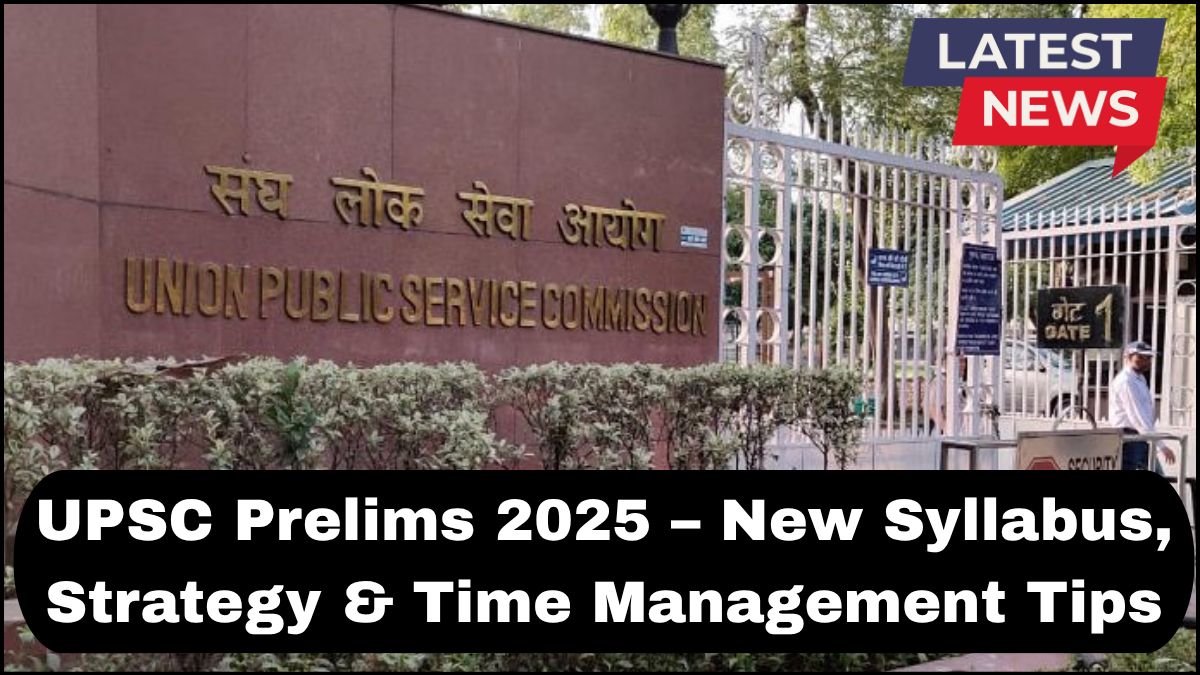The UPSC Prelims 2025 is not just an entrance test; it’s the first milestone on the journey to India’s most prestigious civil services. With the Union Public Service Commission introducing subtle shifts in approach and expectations each year, candidates must stay agile. This guide breaks down the new syllabus, proven exam strategies, and critical time management tips to help you outperform the competition.

Understanding the New Syllabus for UPSC Prelims 2025
While the core structure remains largely consistent, the UPSC Prelims 2025 syllabus reflects a sharper focus on application-based learning. Here’s what you need to know:
General Studies Paper I
- Current Affairs: More emphasis on international relations, government schemes, environmental agreements, and science-tech developments post-2023.
- History and Culture: More weight on regional revolts, socio-religious reform movements, and art forms from underrepresented states.
- Geography: Updated focus on climate change impacts, biodiversity hotspots, and disaster-prone zones.
- Polity and Governance: Expect deeper questions on constitutional amendments, judicial decisions, and center-state relations.
- Economy: More analytical questions on budget allocations, inflation trends, and digital infrastructure.
- Environment: Higher stress on conservation laws, species-in-news, and UN sustainable goals.
CSAT (General Studies Paper II)
- While qualifying in nature, the CSAT paper now demands better comprehension, logical reasoning, and quantitative aptitude. Expect less of rote-type questions and more analytical problem-solving.
Exam Strategy for UPSC Prelims 2025
Creating a winning UPSC exam strategy means combining subject expertise with test-smart planning. Here are tactical steps to build your roadmap:
1. Prioritize High-Return Subjects
Don’t spread yourself too thin. Focus more on scoring sections like Polity, Environment, and Current Affairs. For example, mastering topics from Laxmikant’s Indian Polity can easily fetch 12-15 questions correctly.
2. Integrate Revision Cycles
Follow the “3-Revision Rule”: complete the syllabus thrice before the exam. Use one-cycle notebooks or flashcards to condense notes for quick revisions.
3. Practice with Mock Tests
Enroll in at least one reputed test series. Simulating exam conditions will fine-tune your accuracy and timing. Analyze every mock paper to fix your weak areas.
4. Source Optimization
Avoid the trap of over-resourcing. Stick to 1-2 standard books per subject and supplement with PIB, Yojana, and daily newspapers like The Hindu or Indian Express.
Time Management Tips for UPSC Prelims 2025
Time can make or break your preparation. Here’s how to manage it smartly:
1. Create a Macro Timeline
Break your calendar into monthly targets. Allocate:
- First 4 Months: Syllabus coverage and concept-building
- Next 2 Months: Revision + topic-wise test series
- Last 2 Months: Full-length mocks + intense revision
2. Apply the 60:40 Rule
Spend 60% of your daily prep time on static subjects and 40% on dynamic ones (current affairs, editorials, government reports).
3. Daily Timeboxing
Divide your day into slots:
- Morning: Concept learning (Polity, History)
- Afternoon: Current Affairs + Practice Questions
- Evening: CSAT or Revision
- Night: Light reading or analysis
4. Limit Burnout
Take weekly breaks, practice mindfulness or yoga, and maintain consistent sleep patterns. Mental fitness directly affects retention and recall.
Frequently Asked Questions (FAQ)
Q1. Is there a major change in the UPSC Prelims 2025 syllabus?
No drastic overhaul, but there is an increased focus on application-based questions, especially in current affairs and environment sections.
Q2. How many months of current affairs are required for UPSC Prelims 2025?
At least 12 months prior to the exam. However, a smart candidate focuses on issues, not just news.
Q3. How to prepare for CSAT effectively?
Practice previous years’ papers, identify weak areas (comprehension or maths), and solve at least 20 questions daily.
Q4. What is the best way to balance Prelims and Mains prep?
Till January, keep Prelims as your main focus. Post that, start integrating Mains answer-writing practice weekly.
Q5. How many mock tests should I take before UPSC Prelims 2025?
Aim for at least 30 full-length mocks, along with 100+ topic-wise mini tests.
click here to learn more